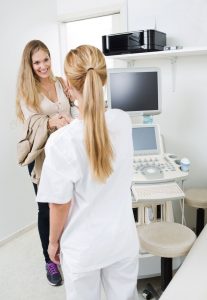Vein Clinics in Pittsburgh
If you get tired achey legs or night cramps…if your ankles are swollen by the end of the day, you may have a Vein problem. In days gone by large scars and hospital stays marked vein treatment. Today half hour office procedures for veins are the norm, with no more than a few mm entrance point. State of the art vein care is available through our Cranberry, Butler , and Beaver Vein Clinics in Pittsburgh at the Advanced Vein Center, Pittsburgh area.
Vein Mapping
Vein mapping is performed by our Certified Vascular specialists in Doppler Ultrasound Exams. We spend over an hour mapping your veins and evaluating them to create your own personal treatment plan for varicose veins. Most procedures are covered by insurance and are able to be done in the comfort of our Pittsburgh area vein clinics. Symptoms of Vein Disease include: swollen legs restless leg syndrome red or blue squiggley veins ankle pain and edema spider veins
How Are Vein Issues Treated?
Compression hose
These stockings apply consistent pressure to help the blood return to the heart. The consistent pressure also lessens swelling in your lower legs and reduces your chance of getting a blood clot. However, your leg veins will still be visible.
If you need compression stockings, a dermatologist can examine you and establish the right size and quantity of compression for you.
Sclerotherapy
The most often used technique for treating leg veins is sclerotherapy. Sclerotherapy has been improved by dermatologists over time to make it safer and give patients better results. Dermatologists increasingly utilize it to treat spider and small varicose veins.
Are Varicose Veins itchy?
Stasis dermatitis, a disease that results in dry, itchy skin, is connected to varicose and spider veins. If the itching is minor, it might just be an annoyance, but for many people, the problem gets worse to the point where they run the danger of harming their skin from scratching excessively or repeatedly. Stasis dermatitis typically causes alterations to the skin right above the ankles.
Do Varicose Veins Pose a Risk?
Is it risky to have uncomfortable varicose veins? The majority of those who have varicose veins will respond “no,” they are not harmful. Although discomfort, aching, tenderness, and itching are common varicose vein symptoms, they usually do not pose a threat to life or limb.
Nevertheless, a small proportion of those who have varicose veins will experience problems, some of which may be severe.
When To Visit A Doctor?
While some varicose veins may be normal and not cause concern, it is important to determine whether they do so. If these veins are not addressed, it may lead to far more serious diseases. Call your doctor right away to schedule a vein screening if you notice any of these symptoms.
Are there potential side effects or complications associated with vein treatments?
While vein treatments are generally safe and well-tolerated, there can be potential side effects and complications, depending on the specific procedure performed. It’s important to note that the occurrence and severity of side effects can vary among individuals. Here are some potential side effects and complications associated with common vein treatments:
- Sclerotherapy:
– Temporary Side Effects: Bruising, redness, or swelling at the injection site.
- Endovenous Laser Treatment (EVLT) and Radiofrequency Ablation (RFA):
– Temporary Side Effects: Bruising, mild discomfort, or numbness along the treated vein.
– Rare Complications: Thermal injury to surrounding tissues, deep vein thrombosis (DVT), nerve damage (rare).
- Ambulatory Phlebectomy:
– Temporary Side Effects: Bruising, swelling, or discomfort around the incision sites.
– Rare Complications: Infection, scarring, changes in skin sensation.
- Compression Therapy:
– Temporary Side Effects: Discomfort, skin irritation, or pressure sores (with improper use).
– Complications: Circulatory compromise if compression levels are too high.
- Venous Insufficiency Treatments:
– Temporary Side Effects: Bruising, discomfort, or inflammation at the treated area.
– Complications: Infection, damage to surrounding structures (rare).
Are there dietary recommendations that can benefit vein health and treatment?
Yes, maintaining a healthy diet can contribute to overall vein health and support the success of vein treatments. While diet alone may not cure vein conditions, certain dietary choices can promote vascular health and reduce factors that contribute to vein issues. Here are some dietary recommendations for vein health:
- Fiber-Rich Foods: Include plenty of fiber in your diet from whole grains, fruits, vegetables, and legumes. Fiber supports digestive health and helps prevent constipation, reducing the strain on veins.
- Hydration: Drink an adequate amount of water to support proper blood circulation. Staying hydrated can help maintain blood volume and prevent blood from thickening, reducing the risk of clot formation.
FREE Vein Screenings at our Vein Clinics in Pittsburgh Call 724-987-3220
FREE Vein Screenings are available at ALL locations. Vein clinic in Cranberry, Butler vein clinic and our Bridgewater vein clinic to name a few. For directions to our vein offices, visit our Locations page. To find out more about the treatment of veins in Pittsburgh, Call today or fill out our form to schedule a FREE Vein Screening 724.987.3220
Want to learn how to achieve healthy veins? Click here to learn more →

